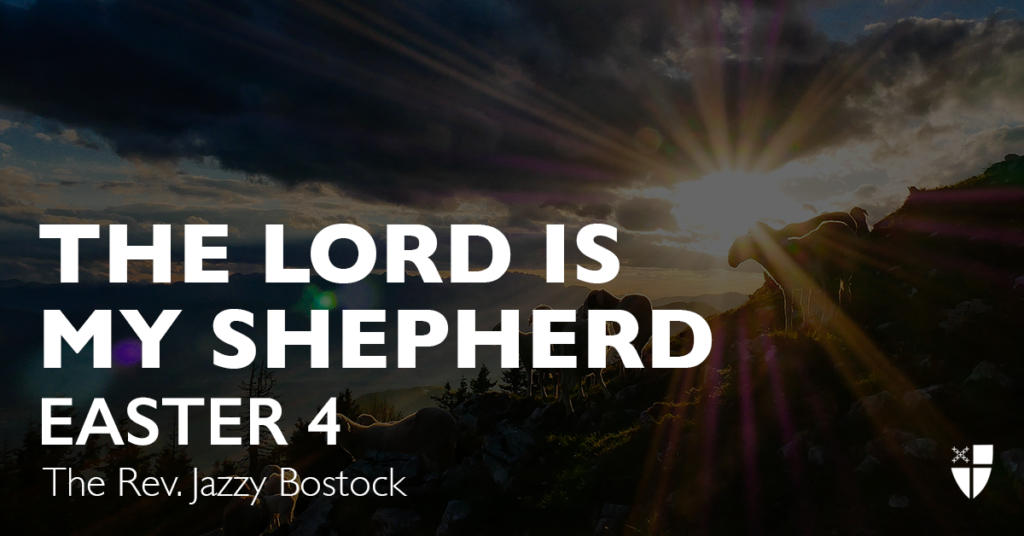The Lord Is My Shepherd, Easter 4 (C) – 2019
May 12, 2019

Before I went to seminary, I spent a year working with my mom on her organic farm on the Big Island of Hawaii. We cared for goats, cows, sheep, chickens, turkeys, geese, ducks, and pigs – as well as tending to vegetable crops and fruit trees. We didn’t have very much of any single thing – the farm was a larger-sized, homestead kind of operation.
Before I started working with her, I knew nothing about any of the animal or plant beings we cared for. After working with them, I have learned a few things. For example – sheep are not easy to train. They are simple, gentle spirits who scare easily. They love to rub their bodies against the sides of fences when they are shedding, leaving clumps of wool behind. There are often a few internal leaders in a herd – but the majority of sheep are happy to follow. Their depth perception isn’t very good – so they often have to rely on someone showing them the way through a gate.
Knowing this about sheep brings a little bit of a different interpretation to the imagery Jesus used when he called himself the good shepherd and us the sheep. In fact, one of our readings today, Psalm 23, is one of the most commonly used passages at funerals. It gives a sense of peace and comfort to family and loved ones who are grieving loss.
“The Lord is my shepherd,” it begins. “I shall not be in want.”
God is promising to take care of us. The promise is that we will be cared for – and that we won’t be in need of anything. Now, I find that interesting, because I so often find that while God does provide for me, it is not always the provision that is according to my want or hope.
“He makes me lie down in green pastures and leads me beside still waters.”
Where I was farming on the Big Island, and the way most farming happens in the United States, animals are pastured, put into pens, rather than left to roam the hillside free. The psalmist, though, is likely talking about a different kind of relationship between the shepherd and sheep. This shepherd, God, finds good places for us to graze and sleep, seeking fresh water to revive us.
“He revives my soul and guides me along right pathways for his Name’s sake.”
The paths God wishes for us – the places God calls us – they are good places. They are right, in alignment. Like sheep allowed to roam a hillside, we have the choice to wander wherever we want, but God will take us on the pathways that will not cause us harm.
“Though I walk through the valley of the shadow of death, I shall fear no evil; for you are with me; your rod and your staff, they comfort me.”
We often look to this psalm to tell us something about God – and it does. But what if it also tells us something about ourselves? At this point in the psalm, the focus shifts. We are no longer talking about God; here, the focus moves from God and what God is like into us – and what faith allows us to be like.
We are fickle at least as often as we are faithful. While God is certainly a good shepherd, I’m not sure that there is such a thing as a good sheep. At least, there weren’t any in the herd I cared for. They weren’t bad, either – they were just basic. Motivated by their basic instincts. One of the instincts that most motivates sheep is fear; although it’s not particularly flattering to admit, I wonder if this is why Jesus chose this particular livestock metaphor.
We, too, are motivated by fear.
And sometimes, we are motivated by fear in ways we don’t even realize ourselves. In fact, one of the pitfalls of fear is the way it sneaks in, manifesting as something else – as self-protectiveness, or concern for home security, or about keeping what belongs to us – these are all fear, dressed up.
I think the psalmist goes through such great lengths to tell us about God and God’s goodness and love and mercy for us, because the psalmist knows that we are fickle and knows that we forget. Telling us about the goodness of God is one of the ways the psalmist is working to address our fear.
If we truly believe these truths about God – if we truly believe in God’s goodness and love for us – our fear is assuaged. If we can overcome fear, which is the most basic of our instincts, we are freed to live into our better selves. If we don’t live in fear, we can follow the instruction and the devotion of the second part of the psalm. It is from this place that we are able to live in faith – not from a place of fear.
Living in the knowledge of God’s goodness and love frees us. We have less to fear and we can live into this world – and into this moment – in fullness and wholeness of faith; we can live in God’s assurance that the whole world is held in God’s hands, and not only our own. Amen.
Don’t forget to subscribe to the Sermons That Work podcast to hear this sermon and more on your favorite podcasting app! Recordings are released the Thursday before each liturgical date.
Receive Free Weekly Sermons That Work Resources!


